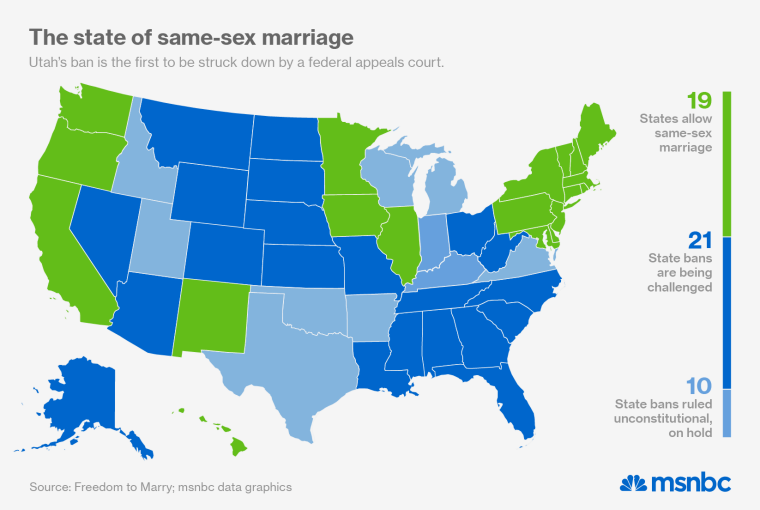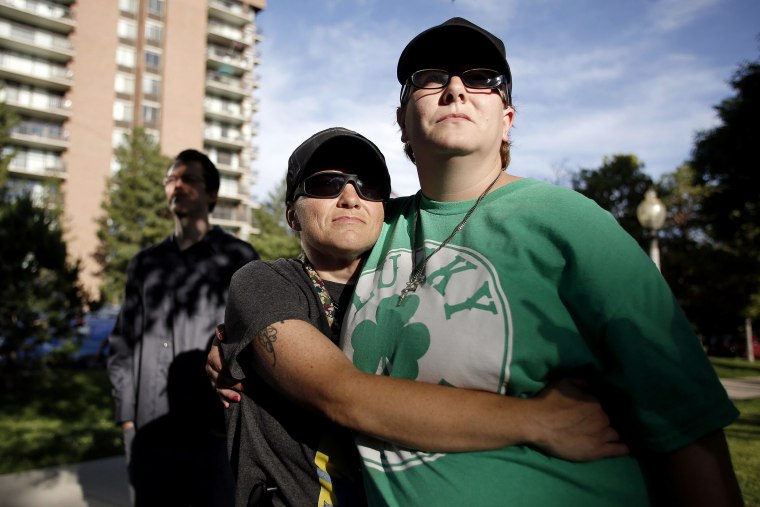The nation’s highest court may soon be answering the question of whether gay and lesbian couples have a constitutional right to marry.
Utah’s Republican Attorney General Sean Reyes announced on Wednesday that he planned to appeal a decision that struck down the state’s ban on same-sex nuptials to the U.S. Supreme Court. Hours later, a federal judge in Colorado became the 16th in the nation to conclude that gay and lesbian couples do indeed have a constitutional right to wed. U.S. District Judge C. Scott Crabtree immediately put his ruling on hold, temporarily leaving in place Colorado's ban on same-sex nuptials.
Last month, a three-judge panel of the 10th Circuit Court of Appeals in Denver voted 2-1 to uphold a lower court’s decision that overturned Utah’s marriage amendment, which limits the union to heterosexual couples. Rather than requesting a review from the entire 10th Circuit, however, Reyes decided to instead try bringing the matter before the high court's justices.
In a statement, Reyes’ office said he was seeking “clarity and resolution from the highest court.”
The Supreme Court is not required to hear the appeal, but given the historic momentum that the marriage equality movement has built -- with an undefeated record in federal court since last year’s landmark Defense of Marriage Act (DOMA) ruling -- many believe SCOTUS will soon decide the matter once and for all, if not with Utah’s case, than with one of the dozens of others pending across the nation.
"It's clear to everyone in the country that whatever the federal constitution requires, this issue is going to the U.S. Supreme Court, probably sometime soon," said James Esseks, director of the ACLU Lesbian Gay Bisexual Transgender & AIDS Project, to msnbc. "At this point, it's a question of which case is it going to be. And truth be told, nobody knows. But the Utah case is out in front."
If Reyes didn't want the limelight, Esseks explained, he could have asked for review with the full 10th Circuit, a move that would have slowed the case down. But going straight to the Supreme Court was bold.
"I read it as a political decision that says, 'We're going to be out front defending marriage exclusion," said Esseks.
Last month’s ruling from the 10th Circuit marked the first time a federal appeals court had found a same-sex marriage ban to be unconstitutional. That decision was put on hold pending an expected appeal, meaning gay and lesbian couples were still barred from marrying in Utah.
The same three-judge panel also heard arguments in a federal challenge to Oklahoma’s ban, but has not yet issued an opinion in that case. A ruling is also expected soon from the Fourth Circuit Court of Appeals, which heard arguments in a marriage equality suit from Virginia last May. In August, the Sixth Circuit will hear arguments in cases from Kentucky, Michigan, Ohio, and Tennessee. And a month later, the Ninth Circuit will hear arguments from cases in Idaho and Nevada.
Nineteen states plus the District of Columbia currently allow gay and lesbian couples to wed. No ban on same-sex nuptials has survived a federal challenge since the Supreme Court dismantled DOMA just over a year ago.

